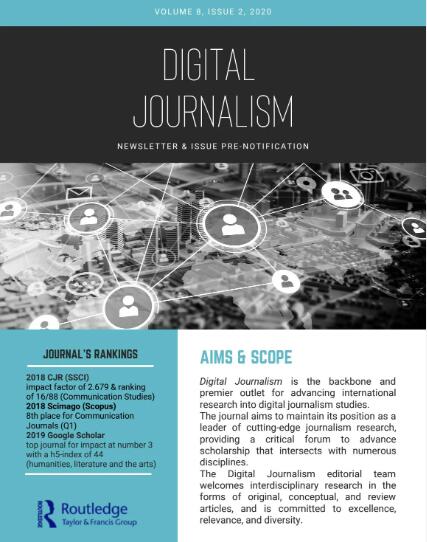Young Adults’ Information Needs, Use, and Understanding in the Context of Instagram: A Multi-Method Study
IF 5.2
1区 文学
Q1 COMMUNICATION
引用次数: 1
Abstract
The use of information has changed in recent years—particularly among young adults, for whom social media are now the most important gateway to engage with news and various other types of information. Focusing on Instagram, this multi-method research project takes an audience-centered approach and investigates how young adults use the platform for (which kind of) information, the information needs that guide their use, and the contextual dynamics that shape their understandings of ‘information (use).’ Empirically, the study builds on a combination of a seven-day diary study with semi-structured qualitative interviews with 48 German Instagram users aged 18 to 24. Analyzing the diaries in conjunction with the interview transcripts allowed us to gain rich insights into information usage practices and how these are influenced by the characteristics of (audiovisual) social media platforms as well as the motives and needs of using them. The findings suggest that Instagram is an integral part of young adults’ information repertoires, although information is usually not actively sought. Moreover, platform characteristics and affordances not only shape possible and actual information behaviors but also matter for whether participants understand their Instagram use as information use.Instagram背景下年轻人的信息需求、使用和理解:一项多方法研究
本文章由计算机程序翻译,如有差异,请以英文原文为准。
求助全文
约1分钟内获得全文
求助全文
来源期刊

Digital Journalism
COMMUNICATION-
CiteScore
11.20
自引率
24.10%
发文量
103
期刊介绍:
Digital Journalism provides a critical forum for scholarly discussion, analysis and responses to the wide ranging implications of digital technologies, along with economic, political and cultural developments, for the practice and study of journalism. Radical shifts in journalism are changing every aspect of the production, content and reception of news; and at a dramatic pace which has transformed ‘new media’ into ‘legacy media’ in barely a decade. These crucial changes challenge traditional assumptions in journalism practice, scholarship and education, make definitional boundaries fluid and require reassessment of even the most fundamental questions such as "What is journalism?" and "Who is a journalist?" Digital Journalism pursues a significant and exciting editorial agenda including: Digital media and the future of journalism; Social media as sources and drivers of news; The changing ‘places’ and ‘spaces’ of news production and consumption in the context of digital media; News on the move and mobile telephony; The personalisation of news; Business models for funding digital journalism in the digital economy; Developments in data journalism and data visualisation; New research methods to analyse and explore digital journalism; Hyperlocalism and new understandings of community journalism; Changing relationships between journalists, sources and audiences; Citizen and participatory journalism; Machine written news and the automation of journalism; The history and evolution of online journalism; Changing journalism ethics in a digital setting; New challenges and directions for journalism education and training; Digital journalism, protest and democracy; Journalists’ changing role perceptions; Wikileaks and novel forms of investigative journalism.
 求助内容:
求助内容: 应助结果提醒方式:
应助结果提醒方式:


